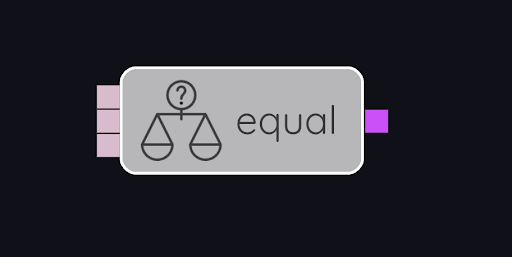equal

shown here for N = 3
| Name | Type | Description | Optional |
|---|---|---|---|
in0 |
?0 |
first comparand |
no |
in1 |
?0 |
second comparand |
no |
… |
|||
in N-1 |
?0 |
N th comparand |
no |
| Name | Type | Description | Optional |
|---|---|---|---|
output |
bool |
true if the comparands are equal, and false otherwise |
no |
equal reads one comparand from each of its inputs and outputs the boolean result of comparing them for equality.
-
For numbers, the comparison uses numerical value.
-
For strings, the comparison is conventional string equality (same length and contents).
-
For bitsets, the sets must be equal. It is an error if the comparands do not have the same capacity.
-
For all other types, the comparands are compared by address, meaning that they are
eqif and only if they are one and the same object in memory.